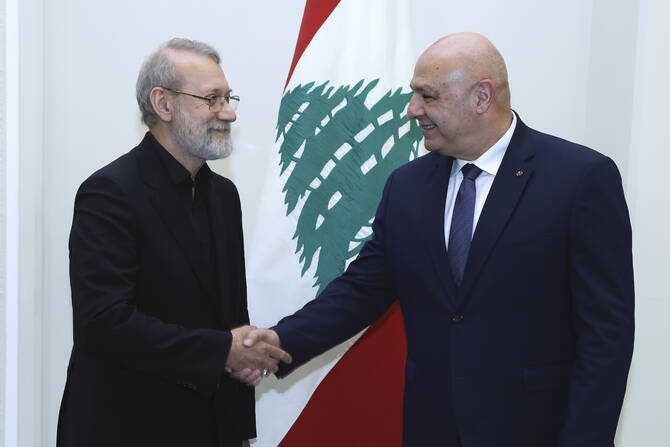
- ARAB NEWS
- 13 Aug 2025

BEIRUT: Lebanese President Joseph Aoun told Iran’s visiting security chief on Wednesday that he rejected any interference in the country’s internal affairs, branding as “unconstructive” Iran’s statements on plans to disarm Hezbollah.
“We reject any interference in our internal affairs,” Aoun said, adding that “it is forbidden for anyone… to bear arms and to use foreign backing as leverage,” Aoun told Ali Larijani, according to a statement from the Lebanese presidency posted on X.
Iran’s top security chief vowed in Lebanon on Wednesday that his government would continue to provide support, after the Lebanese government ordered the army to devise a plan to disarm Tehran-backed militant group Hezbollah.
Larijani’s trip to Lebanon comes after Iran expressed opposition to a government plan to disarm Hezbollah, which before a war with Israel last year was believed to be better armed than the Lebanese military.
“If… the Lebanese people are suffering, we in Iran will also feel this pain and we will stand by the dear people of Lebanon in all circumstances,” Larijani, the head of the National Security Council, told reporters after landing in Beirut.
Dozens of Hezbollah supporters gathered along the airport road to welcome Larijani. He briefly stepped out of his car to greet them as they chanted slogans of support.
In Lebanon, Larijani met with President Joseph Aoun and Prime Minister Nawaf Salam, as well as parliament speaker Nabih Berri, who is close to Hezbollah.
Iran has suffered a series of blows in its long-running rivalry with Israel, including during 12 days of open war between the two countries in June.
Hezbollah’s grip on power has slipped since a war with Israel ended in a November 2024 ceasefire and the new Lebanese government, backed by the United States, has moved to further restrain it.
Hezbollah is part of Iran’s so-called “axis of resistance” — a network of armed groups in the region, including Hamas in Gaza and Yemen’s Houthi rebels, united in their opposition to Israel.
The ouster in December of Bashar Assad in Syria, which long served as a conduit for weapons deliveries between Iran and Hezbollah, cut off the supply route to Lebanon.
AFP